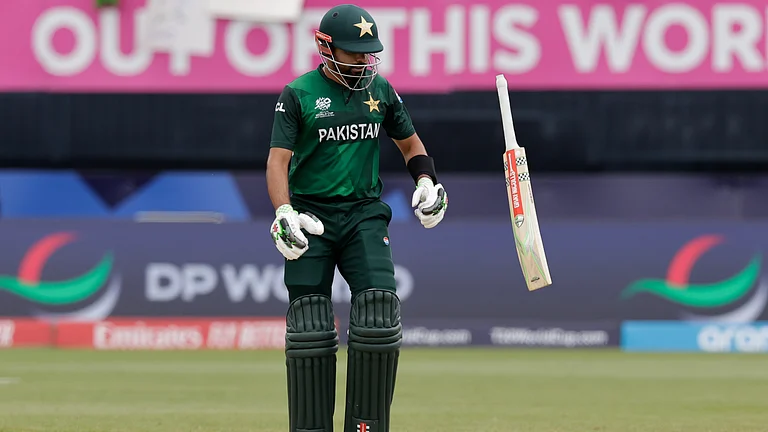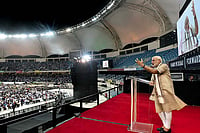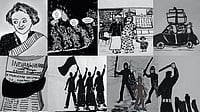An Indian Union Muslim League (IUML) minister’s refusal to light the ceremonial lamp at the inaugural of a public function has snowballed into a major controversy in Kerala, with social media samurais of all hues venting opinions at their vituperative best. Now it’s not the first time that ministers from the League, including the one in question now, have been berated for their famed fear of the light—which ostensibly emanates from a dread of punishment in the hereafter.
The issue grabbed massive attention this time because Malayalam superstar Mammootty, who was also on the dais with education minister P.K. Abdu Rabb, chastised him, saying there was nothing religious about lighting a lamp. “I follow Islam, I am also on Ramzan fast...but I have always lit lamps at functions. It is high time the Muslim League shunned this kind of belief,” the actor reportedly retorted when the minister protested that his refusal was on religious grounds.
While the minister’s refusal to light the lamp symbolises a form of culturally insular literalism coupled with a misplaced sense of religious identity, the actor embodies an everyday believer oozing supreme confidence in his faith as well as in his multi-religious environment. The minister’s mind is constricted by both dogma and the fear of his support base whereas the actor’s is wide open, yet firmly rooted. The minister’s faith is so fragile that he dreads the mere act of lighting a lamp will rob him of eternal salvation, despite the fact that it is the intent of the individual that determines in Islam the meaning and merit of an action.
There are three arguments that Muslims who refuse to light the ceremonial lamp put forth in their defence. Firstly, they submit that citizens have the constitutional right to refuse to take part in any ritual on religious or secular grounds. Secondly, they argue that the ritual of lighting the ceremonial lamp goes back to the ancient rites of fire worship, which are anathema to the Muslims who believe in pure monotheism. Thirdly, the standardisation of the ceremonial lamp and other symbols of upper-caste culture is symptomatic of Hindutva hegemony currently pervading all spheres of Indian public life.
In fairness, all the three arguments are irrefutable on the surface, but, to borrow a Quranic phrase, all the three are ‘words of truth marshalled in the defence of falsehood’. As for the right of the individual to refuse rites and rituals he or she finds unacceptable, no one is questioning the minister’s right not to light the ceremonial lamp. Secondly, the argument about the roots of the ritual of the ceremonial lamp is as true as the claim that the roots of modern banking are in the ancient practice of usury that the Quran promises to punish with hell-fire. That the Muslim League wholeheartedly cooperated with the banking industry and even avariciously vied with other political parties to win elections into the governing bodies of cooperative banks shows that their claims of punctilious adherence to Islamic ideals is rather specious. This argument also applies to the League’s general tolerance of some of its leaders’ notorious indulgences in corruption. Compared to these more serious violations of Islamic ideals that they gleefully perpetrate, lighting a ceremonial lamp with no religious overtones seems quite innocuous.
Had they asserted their Islamic righteousness in their approach to corruption and misuse of power instead of harmless gestures like lamp-lighting, it would have been ethically rewarding and communally uplifting for the society as a whole. In order to avoid any potential stain of polytheism (which is a genuine concern for a believer in Islam), they could have made clear to themselves that their intent in lighting the lamp was pure and socially rather than spiritually determined. They could even invoke the ‘verse of the light’ from the Quran, which can actually Islamise the lighting of the ceremonial lamp and rid the believer of any possibility of compromise with the fundamentals of his faith! “Allah is the light of the heavens and the earth. The similitude of his light is as a niche wherein is a lamp. The lamp is in a glass. The glass is as it were a shining star. (This lamp is) kindled from a blessed tree, an olive neither of the east nor of the west, whose oil would almost glow forth (of itself) though no fire touched it. Light upon light. Allah guideth unto his light whom he will. And Allah speaketh to mankind in allegories, for Allah is knower of all things.” (24:35)
Now to the question of upper-caste symbols dominating our public sphere. It is indeed a serious concern but from the perspective of the Muslims in Kerala, the massive spread of not only dominant cultural symbols from the Arabian peninsula (particularly from Saudi Arabia) but also sartorial and traditional practices having nothing to do with the fundamentals of the faith is a much more insidious menace. In any case, blunt refusals to light a lamp in public and the resultant rise in anti-Muslim feelings in a polity being increasingly brainwashed by Hindu zealots are not the best way to counter upper-caste hegemonies. More importantly, lighting the ceremonial lamp has been an integral part of Muslim religious culture in Kerala for long centuries, and is a distinguishing feature of most mosques, including the Cheraman mosque in Kodungallur, the oldest Muslim place of worship in India. Should we then conclude that the Mappilas have remained fire-worshippers for centuries until the new learned worthies entered the scene and began imposing Salafist puritanism?
The IUML has provided Muslim minorities across the globe a healthy and democratic model of political empowerment worth emulating. Largely thanks to the League, the Kerala Muslim proudly feels and lives out a sense of equal citizenship, perhaps one beyond the dreams of his fellow religionists in the rest of India. Such an illustrious legacy of harmonious political practice and stiff resistance to extremism within the Muslim community should not be bartered away for instant identitarian triumphs.
(The author is an Abu Dhabi-based writer.)





















